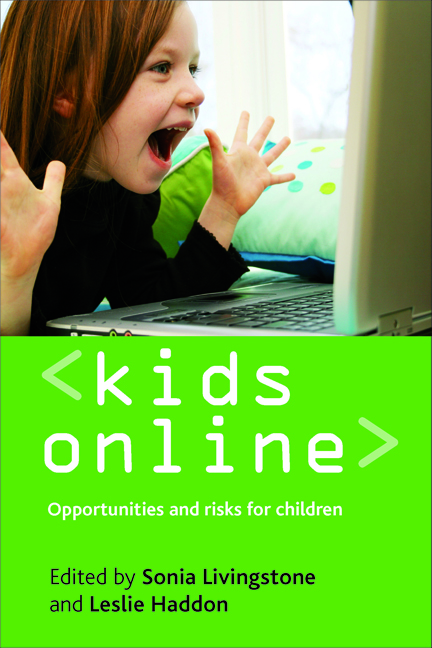Book contents
- Frontmatter
- Contents
- Notes on contributors
- Acknowledgements
- one Introduction
- Section I Researching European children online
- Section II Going online: new opportunities?
- Section III Going online: new risks?
- Section IV Policy implications
- Appendix A List of country codes
- Appendix B Children and parents online, by country
- Appendix C The EU Kids Online network
sixteen - Parental mediation
Published online by Cambridge University Press: 15 July 2022
- Frontmatter
- Contents
- Notes on contributors
- Acknowledgements
- one Introduction
- Section I Researching European children online
- Section II Going online: new opportunities?
- Section III Going online: new risks?
- Section IV Policy implications
- Appendix A List of country codes
- Appendix B Children and parents online, by country
- Appendix C The EU Kids Online network
Summary
Theoretical framework
Parental mediation of children's use of the internet involves the regulation of children's internet use by parents in order to maximise benefits and, in particular, to minimise the potential negative impacts of the internet on children (Livingstone, 2007; Livingstone and Helsper, 2008). The notion originates in socialisation theory that refers to the parent–child relationship as a developmental process and envisions the parental mediation of internet use through regulatory strategies that parents introduce to maximise benefits and minimise risks for their children (Kirwil, 2009a). Therefore, parental mediation of children's use of the internet involves various child-rearing strategies and practices guided by values which are important to parents and which children learn within the family. Parental mediation of internet use is influenced by such characteristics as the age, gender, internet literacy, frequency and motivation for internet use of the child and the gender, socioeconomic status (SES), education, internet use and skills, awareness of online risks and theories of child development of the parents, together with the importance they give to values threatened by internet use and their attitudes towards the internet (Padilla-Walker and Thompson, 2005; Eastin et al, 2006a; Livingstone and Helsper, 2008). Moreover, there seems to be a link with child-rearing values found within a culture (Kirwil, 2009a).
The most useful theoretical framework describes parental strategies for mediating children's internet use by employing a two-dimensional approach: ‘system-based’and ‘user-based’ parental mediation, that is, technical solutions and parental guidance for children. Other frameworks describe a ‘protective’ versus ‘promoting’ parental attitude to children's upbringing, and differentiate between general strategies of social mediation, restrictive mediation and instructive mediation. Types of parental mediation are similar to general parental styles in family socialisation, dimensions of authoritarian, authoritative, permissive and neglectful styles (Eastin et al, 2006a; Lwin et al, 2008).
Technical solutions consist of software installed on the computers used by children to monitor the way they use the internet, that is, what kinds of activities they undertake online, what websites they visit and with whom they communicate. Usually ‘monitoring’ means checking the computer used by the child and blocking inappropriate websites or communication forums and/or talking to the child about the unsuitability and potential negative consequences of these websites and communication forms.
- Type
- Chapter
- Information
- Kids OnlineOpportunities and Risks for Children, pp. 199 - 216Publisher: Bristol University PressPrint publication year: 2009



